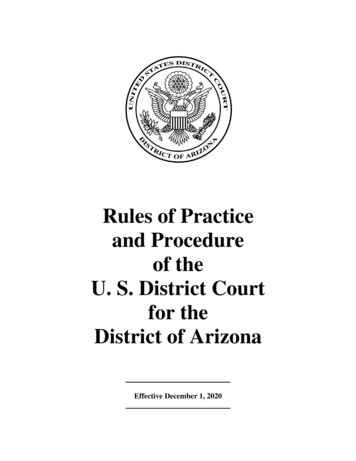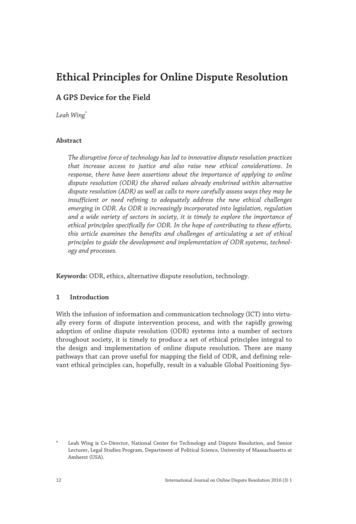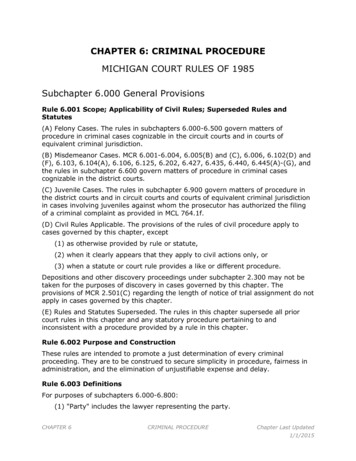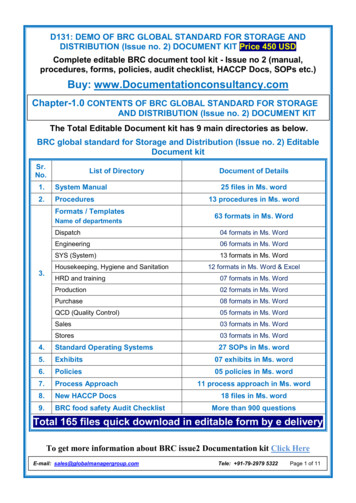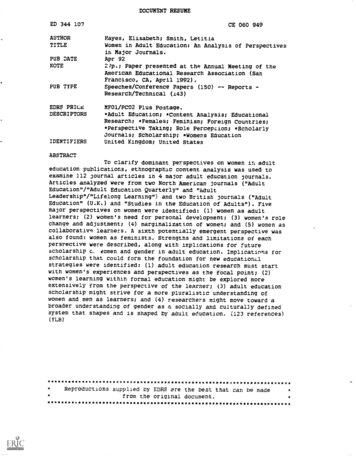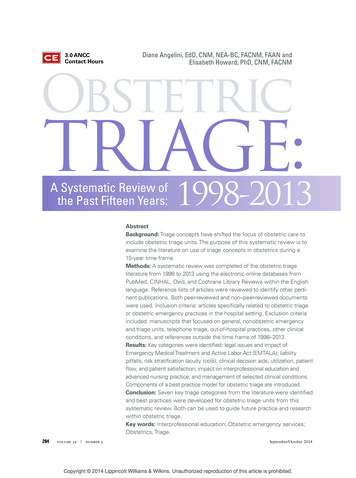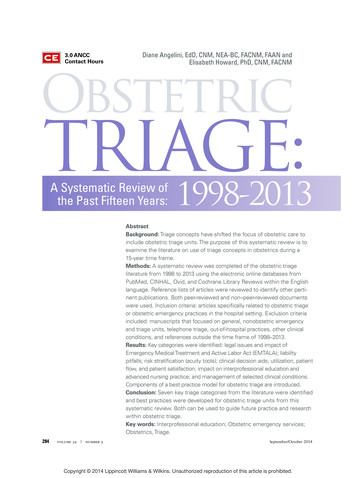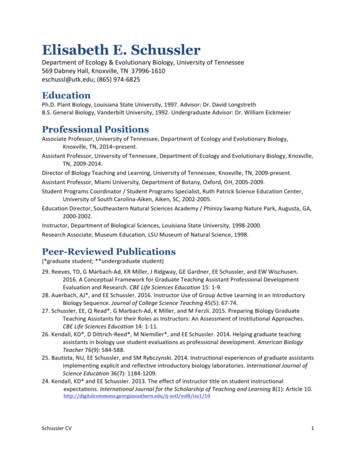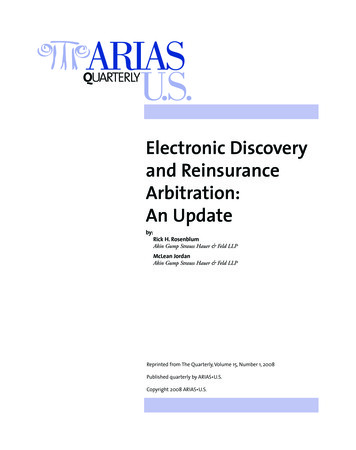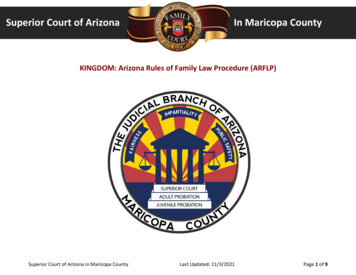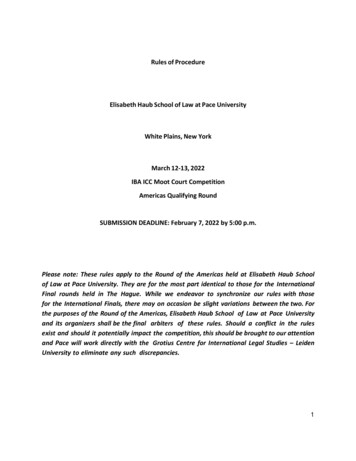
Transcription
Rules of ProcedureElisabeth Haub School of Law at Pace UniversityWhite Plains, New YorkMarch 12-13, 2022IBA ICC Moot Court CompetitionAmericas Qualifying RoundSUBMISSION DEADLINE: February 7, 2022 by 5:00 p.m.Please note: These rules apply to the Round of the Americas held at Elisabeth Haub Schoolof Law at Pace University. They are for the most part identical to those for the InternationalFinal rounds held in The Hague. While we endeavor to synchronize our rules with thosefor the International Finals, there may on occasion be slight variations between the two. Forthe purposes of the Round of the Americas, Elisabeth Haub School of Law at Pace Universityand its organizers shall be the final arbiters of these rules. Should a conflict in the rulesexist and should it potentially impact the competition, this should be brought to our attentionand Pace will work directly with the Grotius Centre for International Legal Studies – LeidenUniversity to eliminate any such discrepancies.1
Chapter 1: General RulesArt. 1 - Objecta. The present rules (“Rules”) govern the International Criminal Court (“ICC”) Moot CourtCompetition 2020 (hereinafter “the Competition”) held in the English language,organized by Grotius Centre for International Legal Studies - Leiden University inpartnership with the International Bar Association (IBA), and the Elisabeth Haub Schoolof Law Pace University (hereinafter the “Organization”)b.The 2022 Competition hall be held entirely online.Art. 2 – Subjecta.All teams participating in the Competition are presumed to have knowledge of andshall be subject to these Rules.Art. 3 - Interpretation of the Rulesa.b.The Organization has the authority to interpret and amend the provisions containedin the Rules.The Organization reserves the right to make changes at any time before thecommencement of the Preliminary Round or when necessary. Any changes made willbe communicated to the participating teams most likely to be affected.Art. 4 - Aim of the CompetitionThe Competition aims to encourage university students to improve their knowledge ofinternational criminal law in practice and in particular of the ICC, its mandate and itsjurisprudence, by simulating its proceedings through arguing a hypothetical case. TheCompetition seeks to enhance the knowledge about the Rome Statute, especially withincountries that have yet to ratify it. In addition, the Competition provides participants with theopportunity to become familiar with the Hague based International institutions.2
Chapter 2: Participation and EligibilityArt. 5 – Participationa.b.c.All educational institutions offering a degree, or similar graduate or postgraduatequalification or training, in law or in a field related to international law, or in internationalrelations, are eligible to participate in the Competition.Each institution may enter one team, regardless of the number of colleges, departments,faculties, or schools within that institution, and the team may include students from oneor more of its colleges, departments, faculties, or schools.Each country, including the United States of America, may be represented by amaximum of five (5) teams who advance to the International Finals.Art. 6 - Team Compositiona.b.c.d.Each team will be comprised of three (3) speakers. Additionally, the team may includetwo (2) researchers and two (2) coaches: one Leading Coach and one Assistant Coach.The amount of team representatives may never exceed seven (7) at any moment in theCompetition.Registration forms may be amended at any time before February 14, 2022. Submittedregistration forms can only be amended with prior approval from the Organization.The Organization reserves the right to allow changes in team composition after thisdeadline in consideration of exceptional circumstances, or in the interests or fairness ofthe Competition.The Coach, or a team member appointed by the team, represents both the university andthe team before the Organization.Art. 7 - Team Member Eligibilitya.b.c.d.Only actively enrolled students in Bachelors, Masters, JD, and LLM Programs areeligible to participate. Exchange students may participate on behalf of their hostuniversity.Non-law students may be considered eligible, provided that they have the requisite legalknowledge. It is each team’s responsibility to ensure that its team members have a levelof legal knowledge suitable for the Competition.Students admitted to practice, by having taken and passed the bar exam, areprohibited to participate.These restrictions shall not apply to the leading and assistant coaches.3
Chapter 3: Team RegistrationArt. 8 - Team Registrationa.b.c.Registration for the Competition will open on August 31, 2022.Each team can for register online via Pace’s Competition h team needs to submit the names of at least three (3) members in order for theregistration to be considered complete.Art. 9 - Team Identificationa.b.c.In the interest of fairness and objectivity, each team shall be assigned an anonymousnumber prior to submission of their memorials. This number will be emailed to each teamby the Organization. This number becomes the team’s identifier throughout theCompetition.Teams must not reveal their identity of their institution or country of origin to the judgesat any time during the Competition.The Organization may disqualify or impose a Penalty against any team that intentionallyor inadvertently discloses its school or country of origin to a judge during a competition,whether or not such disclosure occurs during an Oral Round.Art. 10 - Registration Feea.b.c.d.e.The Organization will issue an invoice for payment of the registration fee toeligible teams.Each team must pay their registration fee within thirty (30) days after the datethe invoice was issued.Incomplete payment of registration fee renders that particular registrationapplication invalid.The Organization reserves the right to accept late payment of registration feesfor extraordinary circumstances.The registration fee will not be refunded under any circumstances.4
Chapter 4: Competition StructureArt. 11 – Structurea.The Americas Round of the Competition shall have two (2) consecutive phases, eachindependently graded: a written round (Memorials) and an oral round (Hearings)Art. 12 – Preliminary Round.a.b.c.d.e.Each team shall address the Case in the roles of the Prosecution Counsel, DefenseCounsel, and Victims’ Counsel, and shall submit one Memorial per role.Each team shall participate in three (3) oral rounds (the “Pre-Rounds”) before theJudges in the roles of Prosecution Counsel, Defense Counsel, and Victims’ Counsel.Each team will have three (3) individual speakers. Every individual speaker of a team willrepresent in their pleadings the Prosecution Counsel, or the Defense Counsel or theVictims’ Counsel.The rebuttal must be presented by the same speaker as the main presentation.Researchers are not allowed to present at any stage of the Competition.Art. 13 - Semi-Final Rounda.b.The written and oral rounds are independently assessed. The sum of the scoresobtained in both stages after the deduction of any penalty points will qualify the nine (9)best teams for the Semi-Final Round. This number may change based upon the numberof schools registered to compete. The number of teams advancing to the Semi-Finalswill be announced prior to the commencement of the Preliminary Rounds.The Semi-Final Round will consist only of an oral phase. The teams are free to choosewhich of their three (3) speakers will present at the Semi-Final Round. They are notbound by the role the speakers presented in the Pre-Rounds.c.To decide which team will argue which role, the team in each round with the highesttotal score thus far will choose its role. The team in each round with the secondhighest score will then choose its role out of the two remaining choices.d.Subject to the exception set forth in Art. 14(a), the results of the written Memorialswill not be taken into account in assessing the final scores of the Semi-Final Round.Art. 14 - Final Rounda.The winner of each Semi-Final round will proceed to the Final Round. Should there befewer than nine (9) teams advancing to the Semi-Finals and only two Semi-Finalmatchups, the third team to advance will be selected from the two Semi-Final runner5
b.c.d.ups based on a formula giving 50% weight to the team’s Semi-Final Round score and50% weight to the team’s combined score from the Preliminary Round oral andwritten phase.The teams are free to choose which of their three speakers will present at the FinalRound. They are not bound by the role the speakers presented in the Pre-Roundsor Semi-Finals.The Bench of the Final Round will assess the substance of the arguments and thequality of the performance of the three teams. It will deliver its judgment andannounce the winner of the Competition (to be picked at the discretion of the Bench,one vote per judge). The team winning the Final Round will be the winner, regardlessof the scoring of the Memorials.Roles in the final round will be assigned based on a random selection.Chapter 5: Memorial ProvisionsArt. 15 - Submission of the Memorialsa.b.All teams participating in the Round of the Americas organized by Elisabeth HaubSchool of Law must submit their three (3) Memorials for each role by email byMonday, February 7, 2022 at 5:00 PM EST.There will be a penalty of five (5) points for each day the briefs are past the duedate. After one week beyond the due date, briefs will not be accepted and the team willbe disqualified without a registration fee refund.Art. 16 - Identification in Memorialsa.Each team must omit the following references in their Memorials:1. Names of team members;2. The members’ and/or the university’s country of residence;3. Its nationality; and4. The name of its university.a. Violations of this article will be sanctioned with up to forty (40) penalty points, with ten(10) penalty points per violation.6
Art. 17 - Memorial Formata.b.c.d.e.f.g.h.Each team must submit its Memorial in Microsoft Word and Pdf format.Each Memorial must be printed on A4 sized paper or standard letter size paper.Each team must submit its Memorials in size 12 Times New Roman font style.Each page shall have a margin of at least 2 cm on every side of the text.Memorials must be continuously page-numbered, excluding the front-cover.The line spacing for all parts of the Memorial is to be 1.5 lines.Headings and subheadings of more than one line in length must be single spaced.Violations of this article are sanctioned with one (1) penalty point per violation.More than one violation of the same item of this Article should be considered as oneviolation in total.Art. 18 - Word LimitEach Memorial must not exceed 10,000 words (including footnotes). Violations of this articleare sanctioned by five (5) penalty points per 400 words. The 10,000 words include thestatement of facts, issues, summary of arguments, written arguments, submissions and(optional) annexes, and exclude the front cover, title page, table of contents, list ofabbreviations and index of authorities.Art. 19 - Order of Contenta.Each Memorial shall be presented in the following order:1. Front cover;2. Title page;3. Table of contents;4. List of abbreviations;5. Index of authorities (list of sources);6. Statement of facts;7. Issues;8. Summary of arguments;7
9. Written arguments;10. Submissions;11. Optional: Annex (max two (2) pages); and12. Back cover.b.Violations of this article are sanctioned by two (2) penalty points per violation. Theswapping of two sections will be sanctioned by one (1) penalty point.Art. 20 - Front Cover Requirementsa.The front cover must contain the following information:1. Team number;2. Role (Prosecution Counsel, Defense Counsel, and Victims’ Counsel);3. Title of the Competition (IBA ICC Moot Court Competition in the English Language);4. Year; and5. Total word count.b.The front cover (page) must be color coded accordingly:1. Green for Prosecution Counsel.2. Red for Defense Counsel.3. Blue for Victims’ Counsel.c.Violations of this article will be sanctioned with one (1) penalty point per violation.Art. 21 – Footnotesa.b.c.Footnotes are to be in Times New Roman font style, size 10 font. Footnotes of morethan one line in length must be single-spaced.Spacing between each footnote shall be single.Consistency in the reference to sources throughout the Memorial is required.One referencing style only may be used throughout the Memorial.8
d.e.f.g.All the sources included in the index of authorities, must be included in thefootnotes as well.Footnotes must be uniform.Abbreviations of sources within footnotes are allowed. The abbreviation has tobe announced in the footnote itself or in the index of authorities.Violations of this article are sanctioned with two (2) penalty points per violation.More than one violation of the same item of this Article should be considered asone violation in total.Art. 22 - Scoring Memorialsa. Scores are awarded on a scale of 50 to 100 points.b. The scoring factors to be considered, without regard to their order of importance, shallinclude, but not limited to: knowledge of the facts and law; proper and articulate analysis;extent and use of research; clarity and organization; evidence of original thought;persuasiveness; grammar and style.Art. 23 - PlagiarismPlagiarism in Memorials will be sanctioned with the disqualification of the team. Ateam’s disqualification is final and irrevocable.Chapter 6: Oral Round ProvisionsArt. 24 – General Proceduresa.b.c.d.Each team shall participate in three (3) Hearings during the Preliminary Round,representing each role once.Each Hearing shall take up to two (2) hours, with each team being allotted a total of thirty(30) minutes.Each team scheduled to appear has a maximum of fifteen (15) minutes from the start ofthe scheduled time to appear before the bench.The Competition will proceed on an ex parte basis at the expiration of the thirty (30)minutes. The Organization may decide to delay the start of the proceedings, orreschedule the session, in exceptional circumstances.Art. 25 – Order of Appearance and Time Divisiona. The order of the pleadings in each Hearing is: Presentation by Prosecution Counsel: up to 20 minutes. Presentation by Defense Counsel: up to 20 minutes. Presentation by Victims’ Counsel: up to 20 minutes. Rebuttal by Prosecution Counsel: up to 10 minutes.9
Rebuttal by Defense Counsel: up to 10 minutes. Rebuttal by Victims’ Counsel: up to 10 minutesb. Any other time division is strictly forbidden. Time not used in the presentation may not beallocated to the rebuttal, and time not used in the rebuttal may not be allocated to thepresentation.c. Questions posed by the Judges are included in the speaking time of the presentation andof the rebuttal, respectively.Art. 26 – Speakersa.b.c.Each team will have three (3) individual speakers. Every individual speaker of a team willrepresent in their pleadings the Prosecution Counsel, or the Defense Counsel or theVictims’ Counsel. The rebuttal must be presented by the same speaker as the mainpresentation.Only two members of each team, speakers and/or researchers, are allowed tobe present before the Bench. The person acting as co-counsel need not be thesame person in each Hearing.Each speaker will speak according to the time allocated under Article 25.Art. 27 – Communicationa.b.Communication between the speakers and the coaches, team members not presenting,or Competition spectators, is strictly prohibited during the Hearings.Violations of this article are sanctioned by up to fifty (50) points. It is up to thediscretion of the Judges, taking into account the seriousness and consequences of theviolation, how many penalty points will be deducted.Art. 28 – Scope of Pleadingsa.b.c.d.A team’s oral pleadings are not limited to the scope of the team’s Memorial. Teams mayrefer directly to the opposing teams’ memorials in their main argument.Speakers are not allowed to introduce new issues in their rebuttal. All arguments andissues raised by opposing counsels during both presentation and rebuttal may bediscussed during the rebuttal.Objections are under no circumstances allowed at any moment during the proceedings.Verbatim reading of the Memorials during the Hearings is strictly prohibited.Art. 29 - Bench Compositiona.Each Bench will be composed of one (1) or two (2) Judge(s) and one (1) Presiding Judge(appointed by the Organization or by consensus by the Judges participating in theHearing) and shall be assisted by a Bench Clerk.10
b.c.d.e.f.g.h.i.j.k.If only two Judges score a given hearing, the Organization shall create a third score byaveraging the scores of the two Judges.The organization may appoint a fourth Judge. In the event four (4) Judges score a givenhearing, the score that is furthest from the average of all four (4) scores, and the scoresheet on which it appears, will be disregarded.If only two Judges score a given Hearing, the Organization shall create a third score byaveraging the scores of the two Judges.An Assistant coach of a participating team can under no circumstance be appointed asa Judge.Judges for hearings can be different from the Bench evaluating the memorials. AllJudges must read the case, as well as other explanatory documents. Though notcompulsory, Judges may wear a judicial robe.Judges are not permitted to give their individual opinion outside thedeliberation room regarding the quality of the presentation and results of theparticipating teams. Furthermore, Judges are not allowed to give theparticipating teams any feedback on the details of the case.During the oral rounds, the Bench shall ensure the respect for the Rules of Procedureand will assess the quality of the arguments. The Judges are encouraged to intervenewith appropriate questions during the oral pleading to further assess the knowledgeand the preparation of the oralists.The Bench will follow its own Rules of Procedure within the framework ofaccepted norms of judicial practice, and with regard to questions of doubt ordispute in the procedure or facts. A decision of the Presiding Member of theBench shall be final.The Judges shall mark the oral arguments in accordance with the scoring criteriaprovided for in these Rules.Team objections to a jury panel due to conflict of interest or prior relationship must bedisclosed and communicated to the Bench Clerk/Bailiff prior to the commencement ofthe Hearing.Art. 30 – Eligibility of Judgesa. The Organization will determine the eligibility of persons to serve as judges in theCompetition.b. Subject to the provisions below, a Judge may not judge a team with whom that judge isaffiliated.c. An “Affiliation” means a professional or close personal relationship between a judge andan institution, coach or team member participating in the Round in which the judge is toserve. A Coach or Assistant Coach of a participating team can under no circumstance beappointed as a Judge.d. The existence of professional relationship between a Judge and a team shall not precludethe Judge from judging that team when—in the determination of the Organizers—thatJudge is not in a position to discover whether or not such an affiliation exists.11
e. The existence or non-existence of an extraordinary personal relationship shall be subjectto the judgment of the Organizers. The mere fact that Judge may be acquainted with aCoach on the basis of past connections such as professional conferences and pastparticipation in the Moot shall not be grounds for disqualifying the Judge. By contrast, aJudge who is the partner or close relative of a Coach or competing student should notjudge that team.f. It is the duty of a judge to report any affiliations at the time he or she registers to judge orsubsequently, directly to the Organizers in advance of the Moot. The Organizers shallinvestigate any reported affiliation (whether self-reported by a judge or otherwise) andshall determine whether such affiliation constitutes a conflict of interest.Art. 31 - Role of the Bench Clerka.The Bench Clerk is nominated by the Organization.b.The Bench Clerk is responsible for:1. The collection of the score sheets and their delivery to the Organization;2. Briefing and advising the Judges on the Rules of Procedure contained herein;3. Keeping order during the Hearing;4. Facilitating the sessions’ development;5. Timekeeping.Art. 32 - Scoringa.b.Scores are rewarded out of a maximum of 100 points for the Presentation and theRebuttal. The Presentation and the Rebuttal shall be awarded with one score only.Points are allocated as follows:1. Organization, structure, and time management: twenty (20) points2. Knowledge and use of rule and principles of law: twenty (20) points3. Knowledge and use of the facts: twenty (20) points4. Questions and rebuttal: twenty (20) points5. Persuasiveness and style of presentation: twenty (20) points12
Art. 33 - Penalties for Inappropriate Behaviora.b.Every team should maintain the fullest dignity and decorum, not only in theCourtroom, but during the entire Competition.Inappropriate behavior or blatant disregard for the procedures may result in thedisqualification of penalty points and in extreme cases to the disqualification ofthe team.Art. 34 – Recording of the Hearinga. Members of the presenting team, may (voice) record their own team members duringtheir presentation and/or rebuttal. However, it is strictly forbidden to (voice) record theopposing teams during their presentation and/or rebuttal.b. Violations of this article are sanctioned with 50 penalty points.Art. 35 - Scoutinga. Scouting is forbidden at all times during the Competition.b. Scouting is defined as:1. When a team or one or more of its members attend a Hearing in which theyare not participants;2. Instances where students, coaches, or spectators discuss with or pose questionsof substantive issues of international (criminal) law to the Judges.c. Violations of this article will result in disqualification. A team’s disqualification is finaland irrevocable.Chapter 7: The AwardsArt. 36 - Categories of the Awardsa. The following awards will be given by the ICC after the Final Round:1. Winner2. First Runner-up3. Second Runner-up13
4. Best Oralistb. The following awards will be given by the Organization after the Final Rounds:1. Best Prosecution Counsel Memorial2. Best Defense Counsel Memorial3. Best Victims’ Counsel Memorialc. Each participating team shall receive a certificate of participation.Chapter 8: The OrganizationArt. 37 – Organizationa.The Regional Round for the Americas and Caribbean is held in White Plains, New York,in the United States and is organized by Elisabeth Haub School of Law at PaceUniversity (http://www.pace.edu/school-of-law/ICC).b.The Pre-Rounds, Semi-Final Rounds and the Final Round of the internationalcompetition are organized by the Grotius Centre for International Legal Studies – LeidenUniversity (www.iccmoot.com).14
The Coach, or a team member appointed by the team, represents both the university and the team before the Organization. Art. 7 - Team Member Eligibility a. Only actively enrolled students in Bachelors, Masters, JD, and LLM Programs are eligible to participate. Exchange students may participate on behalf of their host university. b.
